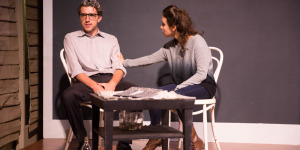As part of their curriculum, students in Psych 1: Introduction to Psychology attended a production David Auburn’s “Proof” over the weekend in order to experience real world examples of the material being taught in class.
“Proof” is typically presented as a dramatic reading to the class, however, this year, the class partnered with Noemi Ola Berkowitz ’16, a former Psych 1 student, to produce and sponsor the “Proof” as a theater production.
“There are a lot of the same ideas you can get from a reading of the full script and a full production,” Hard said. “But the whole production just adds a level of reality to the play, that I think is harder to get from just a reading. The cast completely inhabiting the characters was just so much more powerful.”

(Courtesy of Frank Chen)
“Proof” was first introduced to the Psych 1 curriculum in 2009 by David Goldman, a member of the National Center for New Plays at Stanford. Goldman was interested in producing plays for classes as a way to complement their curriculum. Since then, “Proof” has been an essential part of the curriculum, as it presents students with a different, visual approach to the concepts taught in psychology.
“We definitely see the field of psychology as one that really relates to what we consider as the hard sciences,” said Bridgette Hard, Psych 1 program coordinator. “But also to the arts and humanities, because there are so many interesting questions about human behavior, and human thinking that are explored in productions, and movies. It’s a different way for students to explore some of the different questions that are being presented in our class and an opportunity to build that bridge for students in psychology to the humanities.”
The play follows the story of Catherine, a 25 year old dealing with hallucinations and grief, as she copes with the death of her mentally ill father and struggles in her relationships with her sister, Claire and her father’s past graduate student, Hal. It highlights the reality of mental illness and the effects it has on both the patient and those close to him or her, and explores the question of what constitutes a mental illness.
On Friday, the students started their study of clinical psychology and were able to apply material taught in the class to the human dynamics on stage.
“In psychology, it’s so easy to talk about like ‘this is what happens when you have a mental disorder’ and ‘this is what people are like,’” said Chelsey Pan ’18, a current student. “But I think it’s a very different sort of animal to see something like a production, where you get to see how the things we learn in psychology really play out in human beings.”
“Throughout the production, as interactions on stage were happening, I was pointing out points we went through lecture today about mental disorders and abnormalities,” said Treyvion Foster ’17.
In the future, the coordinators of Psych 1 hope to incorporate other forms of art and theatre into the curriculum. They also encourage other departments to consider partnering with the arts to enhance class material.
“We are very open to partnering with students who want to produce great theater that connects to what we’re doing in psychology,” Hard said. “And I’m sure that other departments would feel similar if there are plays people want to produce that would connect to class. There’s a lot of room for there to be collaboration between the art and other departments here on campus.”
Noemi Berkowitz is a Daily staffer.
Contact Stephanie Zhang at szhang3 ‘at’ stanford.edu.
